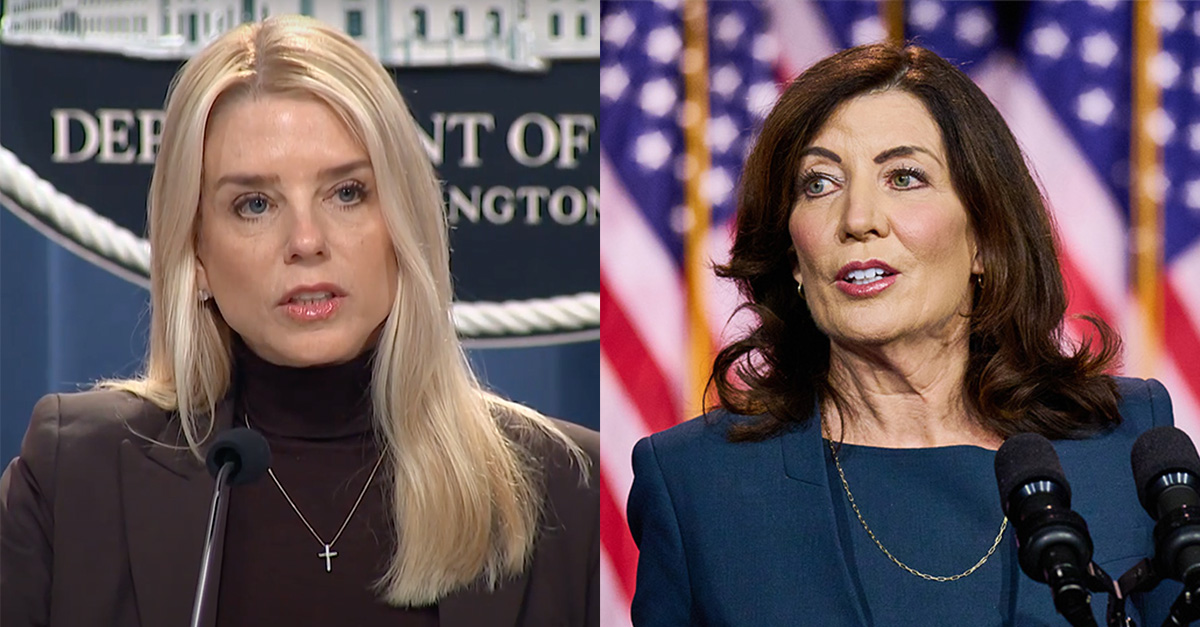


Get a free copy of Parental Rights & Education when you subscribe to our newsletter!

Newly confirmed U.S. Attorney General Pam Bondi is cracking down on sanctuary cities and states that fail to uphold federal immigration law, while also forcing the judiciary to finally answer the question: Does the Constitution’s Supremacy Clause actually mean anything?
Yesterday the U.S. Department of Justice announced a lawsuit against New York state officials over the state’s sanctuary city policies, alleging non-compliance with federal immigration laws.
Sanctuary cities (or states) have laws in place that forbid government officials or law enforcement from inquiring about a person’s immigration status, cooperating with federal immigration authorities, or using city funds to assist federal immigration enforcement activities; this status often calls for policies that are favorable to illegal immigrants, including providing social services and other benefits.
In New York’s case, the central issue in the complaint is the Empire State’s “Green Light Law,” first enacted in 2019, which permits individuals without legal residency to obtain driver’s licenses and restricts the sharing of DMV information with federal immigration authorities.
Bondi contends that the law obstructs federal immigration enforcement efforts. She emphasized that the Justice Department is committed to ensuring state compliance with federal regulations, stating, “We did it to Illinois. Strike one. Strike two is New York. And if you’re a state not complying with federal law? You’re next.”
The lawsuit seeks to overturn the Green Light Law, arguing that it violates the U.S. Constitution’s Supremacy Clause, which establishes the precedence of federal law over state statutes. The Justice Department asserts that the law’s provisions, particularly those limiting information sharing with federal agencies, block the identification and removal of individuals unlawfully present in the country, compromising public safety.
We are taking steps to protect Americans, American citizens, and angel moms,” Bondi explained. “New York has chosen to prioritize illegal aliens over American citizens. It stops today.”
In response, Hochul pledged to fight the lawsuit, saying, “We welcome law-abiding individuals who want to work, pay taxes and contribute to our communities, while at the same time protecting the public safety of all New Yorkers by cracking down on violent criminals. We expect Pam Bondi’s worthless, publicity-driven lawsuit to be a total failure, just like all the others. Let me be clear: New York is not backing down.”
Likewise, James says she will defend the state’s legislation, asserting that it safeguards the rights of all residents and enhances community safety.
Hochul has indicated in the past that she is willing to cooperate with federal authorities possessing valid court orders but maintains that the state’s policies are designed to build trust between law enforcement and immigrant communities.
The Green Light Law was implemented to improve road safety by ensuring that all drivers, regardless of immigration status, are licensed and insured. Supporters argue that it leads to safer driving conditions and allows immigrants the ability to contribute more effectively to the economy.
Opponents, including the Justice Department under Bondi’s leadership, note that the law, originally passed in 2019 and signed by then Gov. Andrew Cuomo, also prohibits DMV officials from disclosing DMV records or information to federal immigration authorities without a warrant from a judge and requires the DMV commissioner to promptly alert an illegal immigrant if a federal immigration agency has requested their information.
The DOJ lawsuit argued that DMV records are essential to helping law enforcement understand in real-time the people and circumstances they may encounter during traffic stops, arrests, and other actions, noting that New York’s Green Light Law “deprives them of this insight; and in turn, unnecessarily forces brave law enforcement officers into dangerous and uncertain circumstances.”
This legal action against New York follows a similar lawsuit filed by the Justice Department against Illinois over its immigration enforcement policies.
“Upon information and belief, the conduct of officials in Chicago and Illinois minimally enforcing — and oftentimes affirmatively thwarting — federal immigration laws over a period of years has resulted in countless criminals being released into Chicago who should have been held for immigration removal from the United States,” the lawsuit reads.
These moves are part of a broader strategy by the federal government to challenge state and local laws that interfere with federal immigration enforcement. Bondi has indicated that other states with comparable laws may also face lawsuits if they do not comply with federal regulations.
The outcome of this lawsuit could have significant implications for the relationship between federal and state authorities concerning immigration enforcement, as the case has the potential to set a precedent for how far states can go in enacting laws that conflict with federal immigration policies.

The DOJ’s legal challenge to the larger movement of sanctuary city policies by progressive states and localities across the U.S. raises a number of moral and legal questions. How should Christians think about this controversy?
Some draw a parallel to the Old Testament concept of cities of refuge, which provided asylum to those who committed unintentional crimes. However, this biblical principle does not justify modern sanctuary city policies, as these cities were established under divine law and structured for justice, not to obstruct legal authorities.
The New Testament instructs Christians to obey governmental laws unless they directly contradict God’s commands (Romans 13:1-7). Sanctuary policies, which shield individuals from legal consequences, are inconsistent with this biblical teaching. Instead of disregarding immigration laws, Christians are called to compassionately assist immigrants within the legal framework, advocating for fair policies while respecting national sovereignty. Upholding the rule of law aligns with Christian ethics, ensuring justice and security for all citizens.
Biblical principles from both the Old and New Testaments also emphasize the importance of the rule of law, instructing governments to prioritize the well-being, safety, and security of their citizens — those for whom they bear responsibility — over non-citizens. In Exodus 12:49, the Israelites are commanded: “The same law applies both to the native-born and to the foreigner residing among you.” Similarly, Leviticus 24:22 states, “You shall have one law for the alien and for the citizen: for I am the Lord your God.”
In addition, 1 Timothy 5:8 states, “But if anyone does not provide for his own, and especially for those of his household, he has denied the faith and is worse than an unbeliever.” This verse underscores the biblical principle that one’s primary responsibility is to care for those under their direct charge. While this applies to individuals, it also reflects a broader truth about governance. Just as a father provides for his family before extending help to others, governments are entrusted with the well-being of their citizens before addressing the needs of non-citizens.
By shielding illegal immigrants from federal law enforcement authorities, sanctuary cities and states place undue burdens on public services such as healthcare, education, housing, and law enforcement. Taxpayer funds, meant to provide for the needs of legal residents, are diverted, straining budgets and reducing the quality of services.
When resources are allocated to support individuals who are not legally entitled to them, it results in overcrowded schools, overextended hospitals, increased competition for jobs and housing, a rise in violent crime, and overall chaos — often to the detriment of lower-income citizens.
Biblical principles emphasize order and justice, recognizing that God establishes governments to maintain peace and security. When laws are enacted to govern immigration — both done legally and illegally — they must be followed unless they force believers to violate God’s moral commands.
Christians can demonstrate love and mercy toward immigrants by providing support through legal avenues, such as sponsoring visas, offering aid through churches, and advocating for just reforms for legal immigration. True compassion operates within a system that balances mercy with justice, ensuring that immigrants and citizens benefit from stable, lawful governance.
Photos: U.S. Attorney General Pam Bondi and New York Gov. Kathy Hochul Credit: YouTube Screenshot/Shutterstock
If you like this article and other content that helps you apply a biblical worldview to today’s politics and culture, consider making a donation here.

Notifications